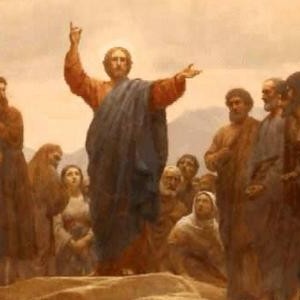A Study of Matthew 20
Parable of the Workers
A study of Matthew 20
By: Pastor Paul R. Mullet
Good evening, my fellow Israelite’s, and members of the Church of the Messiah. It is truly a blessing to be able to bring to you yet another powerful message from our Lord and Savior. Today, we will be discussing the “Parable of the Workers” in Matthew 20. I will bring to you some hard hitting facts, and my own personal opinions, as I do with all of my sermons. It is my duty as a pastor within the Christian Identity faith to always bring you facts, and the information for you to research and find the DIVINE TRUTH within the pages of the Holy Scriptures.
To start with, we must first and foremost understand the meaning of the word “parable”. So to understand this word, we of course would go to the dictionary for a proper definition of this word. Merriam-Webster’s online dictionary defines ‘parable’ as such:
Simple Definition of p arable: a short story that teaches a moral or spiritual lesson; especially: one of the stories told by Jesus Christ and recorded in the Bible.
arable: a short story that teaches a moral or spiritual lesson; especially: one of the stories told by Jesus Christ and recorded in the Bible.
Full Definition of parable: specifically: a usually short fictitious story that illustrates a moral attitude or a religious principle.
It also links to another Merriam-Webster site, called Merriam-Webster’s learners dictionary, which has the definition as such; a short story that teaches a moral or spiritual lesson. He told the children a parable about the importance of forgiveness, especially, one of the stories told by Jesus Christ and recorded in the Bible, i.e., the parable of the Good Samaritan. Now, I hope that you all noticed something that bothers me deeply with this definition, and I hope it bothers you as well. There is one word that stands out, and any learned person of the Faith of Jesus the Messiah should have caught it right off the bat. Did you spot or hear the word I am referring to? If not, then listen carefully, the word that in this definition that SHOULD NOT be there is “fictitious”. You may say, “Pastor, why should that word not be there?”. Folks, that word is a direct attack on and against the Christian faith. [There is no doubt in my mind that the creators of this definition had a purpose in mind, and that is to make the Messiah out to be a fairy-tale, or a myth]. The definition of “fictitious” is:
Full Definition of fictitious 1): of, relating to, or characteristic of fiction: imaginary 2) a: conventionally or hypothetically assumed or accepted a fictitious concept of a name: false, assumed 3): not genuinely felt.
If you do not see from this definition that the attack on Christianity is stronger now than ever, then my friend, I feel sorry for you. Fictitious simply implies fabrication and suggests artificiality or contrivance more than deliberate falsification or deception, as in ‘fictitious characters’.
Now, we really should get back on topic here.
The Messiah’s parable of the workers or laborers in the vineyard, has a profound meaning that some people within our race may miss. What is the Messiah trying to teach His remnant in this parable? I hope that by the end of this sermon you will know WHAT our Messiah is teaching.
I have already provided you with the definition of “parable”, but what about the Messiahs’ use of parables? You see, the Messiah often uses parables as a way to reveal what the Kingdom of Heaven and Yahweh is really like. He portrays how one is to enter into this Kingdom, and who the different players or characters are. As many of you know, I am a firm believer in the thought that ONLY THE TRUE REMNANT can enter into the Kingdom of Yahweh, as most other Christian Identity Pastor’s believe. In this parable of the workers or laborers in the vineyard, there are several things that He tells the disciples and US about the grace of Yahweh and that Yahweh is always more than fair. So, friends, here is my take on the parable of the workers in the vineyard.
This parable begins by showing the TRUE REMNANT what the Kingdom of Heaven is like, and how a member of the race of Adam can enter into this glorious kingdom. In Matthew 20:1-7 KJV, the Messiah states:
“For the kingdom of Heaven is like unto a man that is an householder, which went out early in the morning to hire labourers into his vineyard. And when he had agreed with the labourers for a penny a day, he sent them into his vineyard. And he went out about the third hour, and saw others standing idle in the market-place, And said unto them; Go ye also into the vineyard, and whatsoever is right I will give you. And they went their way. Again he went out about the sixth and ninth hour, and did likewise. And about the eleventh hour he went out, and found others standing idle, and saith unto them, Why stand ye here all the day idle? They say unto him, Because no man hath hired us. He saith unto them, Go ye also into the vineyard; and whatsoever is right, that shall ye receive.”
The master of the house within this parable is Yahweh and the vineyard is the place where those servants who have been called, the TRUE REMNANT, to work for Yahweh as laborers and will enter into that work. The image of a vineyard is often used to represent TRUE ISRAEL of Yahweh’s kingdom (Isaiah 5:1-7 KJV), and that is most likely the case here, as well. The laborers are those faithful Christians, the TRUE REMNANT, the race of Adam, have been called and saved by Yahweh. They enter into their calling or work by Yahweh always under the guidance of the master, and in this parable that is the Messiah. There is another place within the confines of the Holy Scriptures that the Messiah uses this same symbolism or parable to speak of believers being used by Yahweh to labor for the Lord, and it is located in Matthew 9:37-38 KJV, in which He states: “Then saith He unto His disciples, ‘The harvest truly is plenteous, but the labourers are few; Pray ye therefore the Lord of the harvest, that he will send forth labourers into His harvest.’” There is also another angle in this parable. When the vineyard laborers have entered into the harvest, they are in fact entering into a vineyard looking for those who ONLY bear fruit and the Messiah says that those ARE THE TRUE CHILDREN OF YAHWEH, they and they alone will be the ones that are bearing fruit, showing those who are TRULY SAVED AND OF THE RACE OF ADAM, and those that are not (John 15 KJV). The Messiah says; “You shall know them by their fruits”. (Matthew 7:16 KJV)
In Matthew 20:8-13 KJV the Messiah states:
“So when even was come, the lord of the vineyard saith unto his steward, Call the labourers, and give them their hire, beginning from the last unto the first. And when they came that were hired about the eleventh hour, they received every man a penny. But when the first came, they supposed that they should have received more; and they likewise received every man a penny. And when they had received it, they murmured against the goodman of the house, Saying, These last have wrought but one hour, and thou hast made them equal unto us, which have borne the burden and heat of the day. But he answered one of them, and said, Friend, I do thee no wrong: didst not thou agree with me for a penny?”
So here is what I think. The landowner refers to Yahweh Himself, and those that are the workers in His vineyard (Kingdom) are His chosen elect the True Remnant of the house of Israel. You see, some Christians become Christians early on in their lives, and only become better bearer of the fruits, and some later on in the day or in their life, but yet they all receive the same reward from Yahweh. This reward is one that is NOT based on the work you have done, or how long you have been involved; the reward is based on Yahweh’s generosity ONLY!
Some of those Christians (workers) who have been there from their earliest begin to complain against Yahweh’s generosity to those who have only come at the end (of their lives more often than not) or in this parable, the end of the day. Within this parable they (the workers) are complaining because of the landowners’ bad business practice! But Yahweh’s kingdom is NOT a business, it doesn’t work on the principles of business, it works on the principle of grace.
The big key verse for this parable is verse 16 “So the last shall be first, and the first last: for many be called BUT FEW CHOSEN!” One thing that escapes people is that the Messiah used this very same phrase to finish off His teaching in the chapter prior to this parable Matthew 19:30 KJV “But many that are first shall be last; and the last shall be first.” And it is a bit of a theme for this section of the Messiahs’ teachings. It is a phrase that can turn our thinking upside down, and one that we as His TRUE REMNANT should remember, particularly when we think we are better than the others.
What does this parable teach about Yahweh? It teaches us that Yahweh is generous. He does not give us as we deserve; He gives us more!
What does this parable teach about the Kingdom of Heaven and Yahweh? It teaches us that Yahweh’s Kingdom does not operate on the business principles of this world. Yahweh’s kingdom is not like an earthly kingdom – Yahweh’s kingdom is about grace.
What does this parable teach us, well, about ourselves? It teaches us that we are part of Yahweh’s kingdom by His grace, and that the reward of eternal life with the Messiah is a gift that is available for His REMNANT of the House of Israel, who become part of His kingdom. Whether we become True Christians early in our life or late in our life, we all receive the same free gift that Yahweh generously gives, if we produce the fruit.
Let me leave you with this final thought. No TRUE Christian has any right to feel jealous of what Yahweh has given to other believers, even if it’s late in life. Yahweh is generous to all His REMNANT that He saves and if others believe He is overpaying those who enter the Kingdom’s work later then that shows that they are questioning the master of the house or YAHWEH HIMSELF! The first being the last and the last being the first may be the Messiah’s way of saying that whatever time a person comes to saving faith, they all will receive the same wages … since the wages of sin is death (Romans 6:23 KJV), the wages of repentance and trust in the Messiah is eternal life (Romans 6:23 KJV) The thief on the cross will receive the same reward of eternal life as those who labored for the Messiah most of their lives. This doesn’t mean that they will receive the same rewards once they enter the White Gates, since some will be given more responsibility and authority than others, but all who trust in the Messiah will receive the same reward… that of ETERNAL LIFE!
For more Sermons by Pastor Paul R. Mullet please visit Divine Truth Ministries




